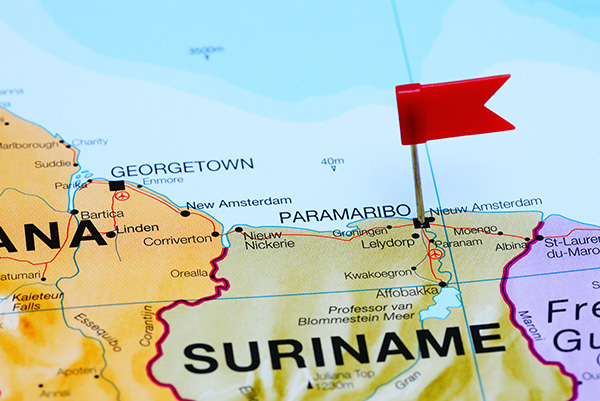Last September, Suriname’s president Chandrikapersad “Chan” Santokhi paid an official visit to the Netherlands, the first in more than a decade of tense relations between the two countries, to strengthen bilateral ties and make a call for cooperation. The visit, which outgoing Prime Minister Mark Rutte called “historic,” included meetings with the king Willem-Alexander at the Noordeinde Palace, with Rutte himself at the Binnenhof and with a delegation of members of Parliament.
Santokhi is the first Surinamese president to pay a working visit to the Netherlands in 13 years, after a decade of diplomatic crisis with former president Desi Bouterse, who first came to power through a military coup in 1980 and was afterwards democratically elected in 2010. Bouterse was convicted in the Netherlands for drug trafficking in 1999, a decision that was taken “in absentia”, and was also investigated in his home country for his involvement with the December Murders of 1982: the execution of 15 political opponents in the capital city Paramaribo. However, Bouterse did not go to jail as the result of an amnesty law during his mandate, which caused the Netherlands to recall its ambassador in 2012. Then, in 2017, Bouterse’s government denied entry to the Dutch ambassador Anne van Leeuwen, and the crisis went on.
It was only in 2020, with the election of Santokhi and a new conviction of Bouterse for the December Murders, that diplomatic relations were properly restored and ambassadors exchanged once more. The new era began for the South American country amidst a deep financial crisis, institutional corruption and the hard-felt impact of the Covid pandemic. Santokhi’s new government started an intensive international campaign of international cooperation, leading to his visit to the Netherlands, which was first programmed to take place in February but was delayed due to the Covid crisis.
In his visit to the Netherlands, Santokhi declared the relationship between the two countries “completely recovered”, and made a case for “intensive cooperation”, effectively called for help in Surinamese security, justice and agriculture, as well as with the pandemic crisis in the country. On his part, Dutch PM Mark Rutte responded by calling the meeting a “reconfirmation of a friendly relationship”. A deeper collaboration between the two countries is considered mutually beneficial, taking into account the direct help Suriname could obtain from the Netherlands, and the potential investment opportunities for the Dutch in the South American country, rich in oil, wood, gold, bauxite and fertile land.
Santokhi also used his visit to make a call for action to the more than 350,000 Dutch citizens with Surinamese roots, an number that is more than half of the 600,000 people currently living in Suriname. He urged them to “don’t sit on the sidelines, but get involved in Suriname”, and to collaborate in the economic recovery of the country. To that end, discussions were held towards the possibility of making work trips for entrepreneurs visa-free in the future. Indeed, the relationship between the two countries is not just on governmental level, but extends to a rich history of the migration of peoples, creating social, cultural, economic and linguistic ties. As Suriname expert Dave Ensberg-Klijkers said in an interview with RTL Nieuws: “These two countries have a lot in common, speak the same language, have shared a lot of history. And it is important to intensify economic cooperation.”
Thus, Santokhi’s visit to the Netherlands seems to have paved the road for a much more stable and beneficial relationship for the two countries. While in the Netherlands, he extended an invitation to the king Willem-Alexander to visit Suriname, a call the Dutch Parliament had also made earlier in the year. Indeed, Prime Minister Rutte saw no obstacles in the future, although he made clear that such visits take years of preparation. During his visit to the Netherlands, Santokhi also opened the Diaspora Institute Netherlands, focusing on the African diaspora that was a result of slave trade in the 16th to 19th centuries, which has a sister institution in Suriname. Santokhi also delivered the Anton de Kom Lecture, on themes of discrimination and tolerance, in the Tropenmuseum in Amsterdam.
Written by Juan Alvaréz
